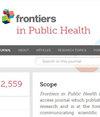听力受损儿童及其父母在 COVID-19 大流行中的心理负担
IF 3.4
3区 医学
Q2 PUBLIC, ENVIRONMENTAL & OCCUPATIONAL HEALTH
引用次数: 0
摘要
目的 儿童听力障碍对儿童及其父母的心理健康都有潜在的影响。作为获得医疗服务的弱势群体,他们可能会面临特殊的挑战,尤其是在 COVID-19 大流行期间。本横断面研究旨在调查儿童听力障碍与儿童及其父母的心理健康之间的关系,并评估听力障碍儿童在 COVID-19 大流行期间利用医疗保健服务的情况及其对双方心理结果的影响。我们使用逻辑回归模型研究了儿童听力障碍与智力结果之间的相关性。结果在考虑协变量后,听力受损儿童患焦虑症(OR 2.33,95% CI 1.79-3.02)或抑郁症(OR 2.14,95% CI 1.59-2.88)的频率更高。听力受损儿童的父母患焦虑症(OR 1.55,95% CI 1.20-2.01)或抑郁症(OR 1.73,95% CI 1.30-2.29)的几率明显更高。听力障碍与调查年份对父母心理健康结果的交互作用被观察到(交互作用的 p <0.1)。有听力障碍的儿童因大流行而报告延迟就医(OR 2.00,95% CI 1.11-3.59)或取消就医(OR 1.96,95% CI 0.98-3.96,p = 0.059)的几率更高。COVID-19大流行导致的延迟就医(OR 12.41,95% CI 2.78-55.46)或取消就医(OR 6.26,95% CI 1.28-30.75)显著增加了听障儿童的焦虑频率。在 COVID-19 大流行等公共卫生突发事件中,听力受损儿童的家庭似乎处于弱势地位,这可能会进一步加剧他们的精神状况。本文章由计算机程序翻译,如有差异,请以英文原文为准。
Psychological burden of hearing-impaired children and their parents through the COVID-19 pandemic
ObjectiveChildhood hearing impairment has potential repercussions on the mental well-being of both children and their parents. As a vulnerable population in accessing health care services, they may face specific challenges, especially during the COVID-19 pandemic. This cross-sectional study aims to investigate the association between childhood hearing impairment and the mental health of children and their parents, and to assess health care utilization of hearing-impaired children and its impact on mental outcomes for both during the COVID-19 pandemic.MethodsUsing the National Health Interview Survey (NHIS) database, we analyzed data for 15,989 children aged 5–17 and their corresponding parents. The correlations between childhood hearing impairment and mental outcomes were examined using logistic regression models. The 2020 (quarter 3 and quarter 4)-2021 NHIS data was singled out and re-analyzed, focusing on the utilization of medical care during the COVID-19 pandemic.ResultsAfter accounting for covariates, hearing-impaired children exhibited a higher frequency of anxiety (OR 2.33, 95% CI 1.79–3.02) or depression (OR 2.14, 95% CI 1.59–2.88). Parents of hearing-impaired children had significantly higher odds of a higher frequency of anxiety (OR 1.55, 95% CI 1.20–2.01) or depression (OR 1.73, 95% CI 1.30–2.29). Interaction effect of hearing impairment with survey year on parents’ mental health outcomes was observed (p for interaction <0.1). Children with hearing loss had higher odds of reporting delayed medical care (OR 2.00, 95% CI 1.11–3.59) or canceled medical care (OR 1.96, 95% CI 0.98–3.96, p = 0.059) due to the pandemic. Delayed medical care (OR 12.41, 95% CI 2.78–55.46) or canceled medical care (OR 6.26, 95% CI 1.28–30.75) due to the COVID-19 pandemic significantly contributed to the increase of anxiety frequency in hearing-impaired children.ConclusionChildhood hearing impairment exhibits a substantial impact on children’s and parental mental health, which is further exacerbated by the COVID-19 pandemic. Families of hearing-impaired children appear to be in a vulnerable position during public health emergencies such as the COVID-19 pandemic, which can further exacerbate their mental outcomes.
求助全文
通过发布文献求助,成功后即可免费获取论文全文。
去求助
来源期刊

Frontiers in Public Health
Medicine-Public Health, Environmental and Occupational Health
CiteScore
4.80
自引率
7.70%
发文量
4469
审稿时长
14 weeks
期刊介绍:
Frontiers in Public Health is a multidisciplinary open-access journal which publishes rigorously peer-reviewed research and is at the forefront of disseminating and communicating scientific knowledge and impactful discoveries to researchers, academics, clinicians, policy makers and the public worldwide. The journal aims at overcoming current fragmentation in research and publication, promoting consistency in pursuing relevant scientific themes, and supporting finding dissemination and translation into practice.
Frontiers in Public Health is organized into Specialty Sections that cover different areas of research in the field. Please refer to the author guidelines for details on article types and the submission process.
 求助内容:
求助内容: 应助结果提醒方式:
应助结果提醒方式:


